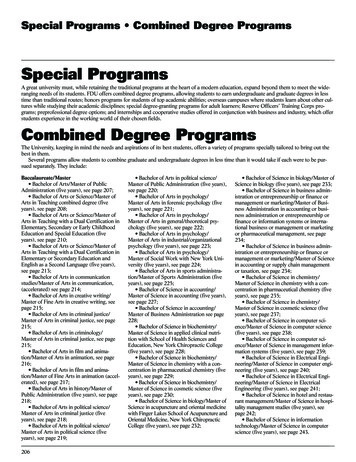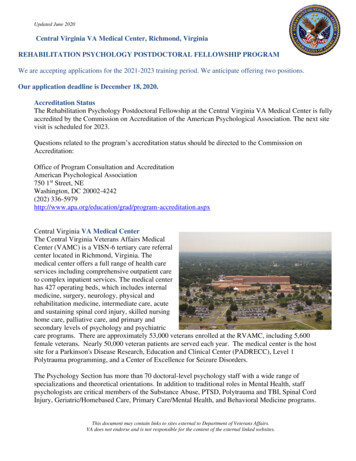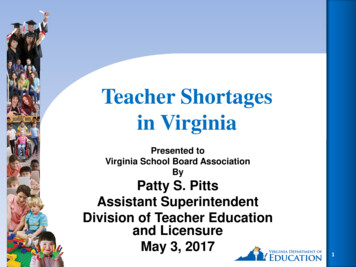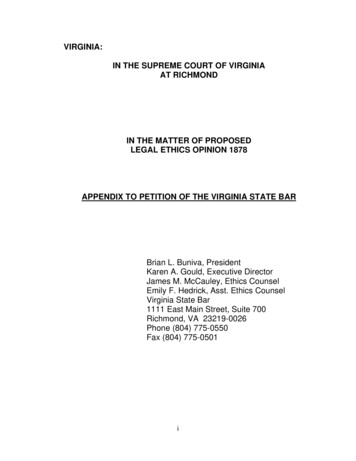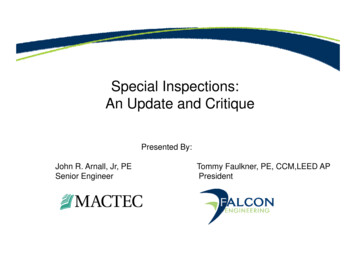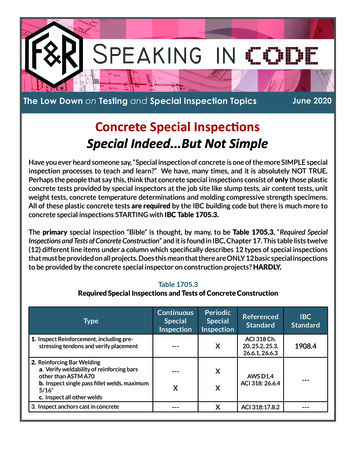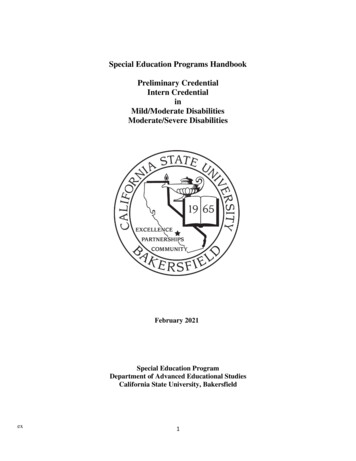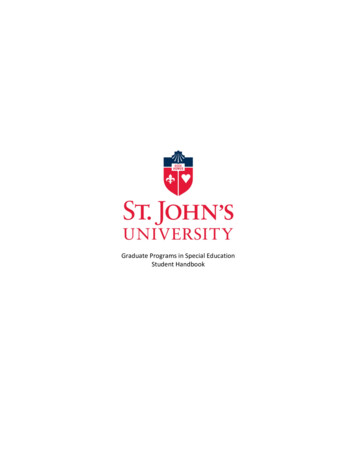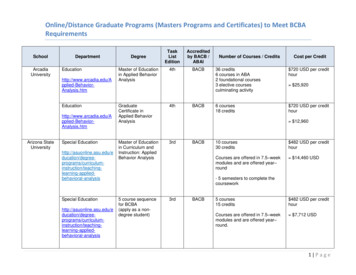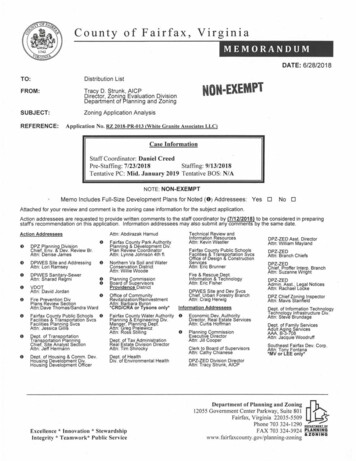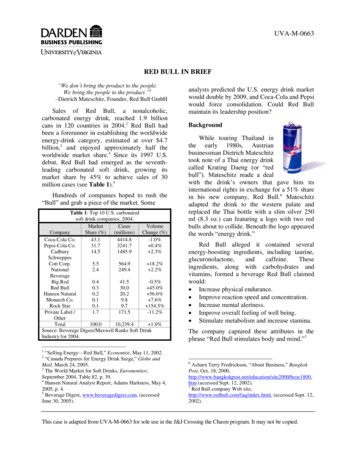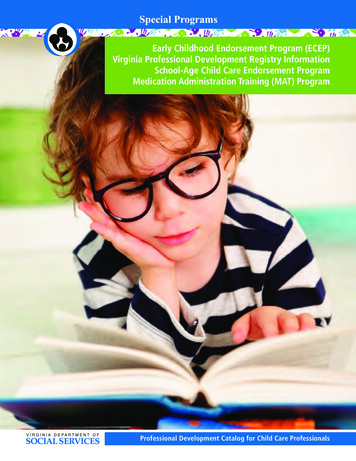
Transcription
Special ProgramsEarly Childhood Endorsement Program (ECEP)Virginia Professional Development Registry InformationSchool-Age Child Care Endorsement ProgramMedication Administration Training (MAT) Program7Professional Development Catalog for Child Care Professionals
Special ProgramsEarly Childhood Endorsement Program (ECEP)OPTION 2 – PARTICIPATION VIA COMPLETION OFCOLLEGE CREDIT COURSESUpon successful completion of the appropriate college credit course asnoted above, participants are eligible to apply for the correspondingVDSS Endorsement. Individuals who wish to apply for either Endorsementbased upon completion of college credit courses must: Complete the application (available atwww.dss.virginia.gov/family/cc/professionals resources.cgi) Enclose a copy of the college transcript or Letter of Completion fromyour instructor Submit application, transcript or letter, and processing fee for eachendorsement.The Early Childhood Endorsement Program offers fourendorsements:1. Infant and Toddler Endorsement (for professionals working withinfants and toddlers)2. Preschool Endorsement (for professionals working with preschoolchildren)3. Early Childhood Endorsement I – Creativity Series (for professionalsworking with infants, toddlers, and preschool children)4. Early Childhood Endorsement II – Health, Safety, Nutrition Series (forprofessionals working with infants, toddlers, and preschool children)All of the Endorsements can be valuable as:1. Entry-level credentials for employment in the field of early childhood2. Demonstration of basic knowledge in working with infants, toddlers,and preschool children3. Supplements to a child-related degree or credential that does notinclude instruction on infants, toddlers, or preschool children4. Supplements to a degree or credential outside the field of early childhoodCOURSE REQUIREMENTS FOR EACH VDSS ENDORSEMENTInfant and Toddler EndorsementThe Infant and Toddler Endorsement requires completion of the following12 online courses. Successful completion of each course provides 4 clockhours of training credit, with the exception of the Early ChildhoodTheorists course, which provides 6 clock hours of training credit. Thecourses can be taken in any sequence. Ages and Stages of Development for Infants and Toddlers Beyond Babble: Exploring Early Language Development Child Abuse and Neglect: Recognition and Reporting Creating an Appropriate Learning Environment for Infants and Toddlers Early Childhood Theorists Guiding the Behaviors of Infants and Toddlers Health Screening for Child Care Professionals Nurturing Productive Partnerships with Parents Observation and Recording in Early Childhood Planning Activities for Infants and Toddlers Preventing Injuries in the Child Care Environment Understanding Temperaments of Infants and ToddlersAdditionally, successful completion of courses for the Endorsements canfulfill professional development options for teaching licensure renewalrequirements, annual licensing requirements, and professional developmentoptions for early childhood professionals participating in Virginia’s StarQuality Initiative Program. The courses can also be used to meet thetraining requirements for the Child Development Associate (CDA)credential.Participants have two options by which to achieve an Endorsement:1. Successful completion of the required VDSS-sponsored online coursesas outlined under ‘Course Requirements’ below2. Successful completion of the required college credit courses offeredby the Virginia Community College System outlined below: Infant and Toddler Endorsement – CHD 166 Infant and ToddlerPrograms Preschool Endorsement – CHD 120 Introduction to Early ChildhoodEducation Early Childhood Endorsement I – Creativity Series CHD 145Teaching Art, Music and Movement to Children Early Childhood Endorsement II – Health, Safety, Nutrition SeriesEDU 235 Health, Safety and Nutrition EducationPreschool EndorsementThe Preschool Endorsement requires completion of the following 12online courses. Successful completion of each course provides 4 clockhours of training credit, with the exception of the Early Childhood Theorists course, which provides 6 clock hours of training credit.The coursescan be taken in any sequence. Ages and Stages of Development for Preschool Children Child Abuse and Neglect: Recognition and Reporting Creating an Age-Appropriate Learning Environment for Preschool Children Early Childhood Theorists Exploring Brain Development Guiding the Behaviors of Preschool Children Health Screening for Child Care Professionals Nurturing Productive Partnerships with Parents Observation and Recording in Early Childhood Planning Appropriate Activities for Preschool Children Preventing Injuries in the Child Care Environment Reframing DisciplineOPTION 1 – PARTICIPATION VIA COMPLETION OFVDSS-SPONSORED COURSESIndividuals who wish to obtain either of the Endorsements must: Register for the required Endorsement courses outlined below Complete all required courses Complete all assessments and submit for grading Achieve a passing score of 70% or higher on each course to receiveeither of the Endorsements8continues to page 9 Professional Development Catalog for Child Care Professionals
Special ProgramsVirginia Professional Development Registry Informationcontinued from page 8PROFESSIONAL DEVELOPMENT REGISTRYFOR THE EARLY CHILDHOOD AND SCHOOL-AGECHILD CARE PROFESSIONEarly Childhood Endorsement I – Creativity Series13 online courses. Successful completion of each course provides 4 clockhours of training credit. The courses can be taken in any sequence. Creative Junk for Fun and Learning Facilitating Brain Development in Young Children Incorporating Creativity into Early Childhood Curricula Movin’ and Groovin’: Using Movement to Help Young Children Learn Music in the Early Childhood Classroom Observing and Recording the Creative Process in Young Children Pinch, Pull, Twist, and Turn – Small Motor Development in Early Childhood Promoting Creativity and Including All Children Roles of Imagination, Play and Dramatic Play in Early Childhood Storytelling in the Early Childhood Curriculum Three-Dimensional Creative Activities for Young Children Two-Dimensional Creative Activities for Young Children Why is Creativity Important?Virginia is one of a few states that do not currently have astatewide professional development registry.A professional development registry is a tool used by the earlychildhood development and school-age care profession to: promote professional growth and development, gather and maintain core data, e.g., training and education,regarding providers and trainers and the training offered toproviders, place individuals on one of the Career Lattice Step levels basedon verified education and training information, recognize and honor professional achievements of early childhooddevelopment and school-age care professionals, and inform policy makers and partners, e.g., by tracking the impactof public and private investments in quality supports to childcare programs.Early Childhood Endorsement II – Health, Safety, Nutrition SeriesThe Early Childhood Endorsement II requires completion of the following12 online courses. Successful completion of each course provides 4 clockhours of training credit. The courses can be taken in any sequence. Chronic Health Conditions in Early Childhood Controlling Communicable Illness in the Early Childhood Classroom Creative, Healthy Cooking with Young Children Developing Healthy Habits in Young Children Ethics for Early Childhood Professionals Food Safety in the Child Care Environment Health Makes a Difference in Early Childhood Making Meal Times Fun in the Early Childhood Classroom Management of Injuries and Acute Illness in Early Childhood Nutritional Guidelines in Early Childhood Safety in a Quality Early Childhood Environment Teaching Young Children about Health, Safety and NutritionWhy join the registry? The registry tracks professional education and development (forall training) and provides a pathway (career lattice placementbased on education and training) for child care providers whowish to advance in their career; Since education and training is verified by registry staff throughsubmission of proper documentation (e.g., college transcripts,training certificates, etc.), a staff professional development record,which will be developed for each registry member, could potentially be used to verify compliance with licensing, accreditation,Virginia Star Quality Initiative, and credentialing requirements; The registry can assist individuals and program directors inprofessional development planning; The registry will help provide data on Virginia’s early childhoodand school-age care profession - data that we really haven’thad access to in the past; The registry will provide recognition for providers’ training andeducation by providing a Registry Certificate that can be postedand/or shared with employers and/or parents; The registry will have a trainer and training approval component,which will assist providers in finding quality trainers and training;and The registry will be Web-based and will provide access to a varietyof helpful resources and information, including a resume builder,links to useful resources, information updates, frequently askedquestions, etc.FOR ADDITIONAL INFORMATION CONTACT:Peggy WatkinsChild Care Aware of Virginia(804) 285-0846peggyw@va.childcareaware.orgLOOK FOR NEWS ABOUT THIS EXCITING, USEFULTOOL IN THE NEAR FUTURE!9Professional Development Catalog for Child Care Professionals
Special ProgramsSchool-Age Child Care Endorsement ProgramALL-NEW SCHOOL-AGE CHILD CARE ENDORSEMENT!The School-Age Child Care Endorsement requires successful completionof the following 12 online courses. Successful completion of eachcourse provides 4 clock hours of training credit. The courses can betaken in any sequence. Ages and Stages of Development for School-Age Children 5 to 8 Ages and Stages of Development for School-Age Children 9 to 12 Child Abuse and Neglect: Recognition and Reporting for School-AgeChildren Clubs and Special Interest Groups for School-Age Children Creating Appropriate Learning Environments in School-Age Child Care Guiding the Behaviors of School-Age Children Health Screening for Child Care Professionals Homework, Holiday and Summer Activities for School-Age Children Observation and Recording of School-Age Children Partnerships with Parents of School-Age Children Planning Appropriate Activities for School-Age Children Preventing Injuries in the School-Age EnvironmentVirginia Department of Social Services Division of ChildCare and Early Childhood Development announces theALL-NEW School-Age Child Care Endorsement! Thisendorsement is designed to provide basic knowledgefor working with children 5 to 12 years old in anyschool-age child care program (e.g., before/after care,summer child care, family day home). Twelve all-newonline courses have been developed to provide highquality training for school-age child care professionalsin Virginia.The VDSS School-Age Endorsement can be valuable as: Entry-level credential for employment in the field of school-agechild care Demonstration of basic knowledge in working with children 5 to 12 Supplement to a child-related degree or credential that does not includeinstruction on working with school-age children in a child care setting Supplement to a degree or credential outside the field of school-agechild careFOR ADDITIONAL INFORMATION CONTACT:Peggy WatkinsChild Care Aware of Virginia(804) 285-0846peggyw@va.childcareaware.orgAdditionally, completion of classes for the School-Age Child Care Endorsement can be used toward compliance with annual VDSS licensingrequirements.Individuals who wish to obtain the VDSS School-Age Child CareEndorsement must: Register to attend the component courses outlined below Complete all required courses Complete all assessments and submit for grading Achieve a passing score of 70% or higher on each course to receivethe School-Age Child Care Endorsement10Professional Development Catalog for Child Care Professionals
Special ProgramsMedication Administration Training (MAT) ProgramCode of VirginiaDrug Control Act CHAPTER 34.§ 54.1-3408. Professional use by practitioners.O. In addition, this section shall not prevent the administration of drugs by a person to a child in a child day program as defined in § 63.2-100 and regulatedby the State Board of Social Services, the Child Day Care Council, or a local government pursuant to § 15.2-914, provided such person (i) has satisfactorilycompleted a training program for this purpose approved by the Board of Nursing and taught by a registered nurse, licensed practical nurse, doctor ofmedicine or osteopathic medicine, or pharmacist; (ii) has obtained written authorization from a parent or guardian; (iii) administers drugs only to the childidentified on the prescription label in accordance with the prescriber’s instructions pertaining to dosage, frequency, and manner of administration; and (iv)administers only those drugs that were dispensed from a pharmacy and maintained in the original, labeled container that would normally be administeredby a parent or guardian to the child.Standards for Licensed Child Day Centers and Standards for Licensed Family Day HomesThe regulations for licensed child day centers and family day homes contain a standard that goes beyond the requirements of the law and require medicationadministration training for anyone who administers prescription AND non-prescription medications.CHILD DAY PROGRAMSMEDICATION ADMINISTRATION TRAININGChild day centers (licensed)Training required for administration of Prescription andNon-Prescription medicationsFamily day homes (licensed)Training required for administration of Prescription andNon-Prescription medicationsReligiously exempt child day centers (regulated)Voluntarily registered family day homes (regulated)Family day homes approved by a (licensed) Family Day SystemCertified preschools (regulated)Local ordinance approved family day homesTraining required only for administration of Prescription medicationsTraining required only for administration of Prescription medicationsTraining required only for administration of Prescription medicationsTraining required only for administration of Prescription medicationsTraining required only for administration of Prescription medicationsImportant Information Get Answers to MAT Training Questions – For answers to questions about MAT training, including MAT curriculum content, MAT procedures/processes,MAT or PMAT classes, MAT recertification, MAT/PMAT training certificates, approved MAT trainers, etc., contact Medical Home Plus (MHP) at:MAT@medhomeplus.org. MHP administers and manages the MAT Program under contract with VDSS. Best Practice – The Medication Administration Training for Child Day Programs teaches BEST PRACTICE and covers the administration of all medications,both prescription and non-prescription. MAT Recertification – MAT Certification is valid for three (3) years from the issue date indicated on the MAT Certificate. Providers and/or staffmembers must be recertified prior to the date the certificate expires in order to continue to administer medication to children in a child day program. Two Options for Completing the MAT Course: Classroom-based – Providers may choose to complete the MAT course in a classroom setting with an approved MAT Trainer. Providers mustattend the entire class and successfully pass the written and skills competencies. Class size is limited to 8 participants. Independent Study – Providers may choose to complete the MAT course by independent study. The MAT Independent Study is made up of twoparts. Part One is a self-paced, online review of the MAT course content using MAT course handouts, video segments and independent exercises.Part Two consists of hands-on practice time and testing with an approved MAT Trainer. Providers must successfully pass the written test and skillscompetencies. Class size for Part Two of the MAT Independent Study is limited to 4 participants. For more information on the MATIndependent Study visit: www.medhomeplus.org/MAT/index.php, scroll to MAT Independent Study for Child Day Programs in Virginia andclick on the link to the instructions. Find a MAT or PMAT Class – To find scheduled Medication Administration Training (MAT) and Pre-Medication Administration Training (PMAT) classes,visit the VDSS website at: www.dss.virginia.gov/family/cc providertrain/tips.cgi, scroll through the class listings. Be sure to contact the classsponsor for class details or registration information. Find/Contact an Approved MAT Trainer – To find/contact an approved Medication Administration Training (MAT) trainer, visit the Medical HomePlus website at: www.medhomeplus.org/MAT/index.php, under (MAT) Medication Administration Training, scroll to Find a MAT Trainer Near You.11Professional Development Catalog for Child Care Professionals
12 online courses. Successful completion of each course provides 4 clock hours of training credit, with the exception of the Early Childhood Theorists course, which provides 6 clock hours of training credit. The courses can be taken in any sequence.
